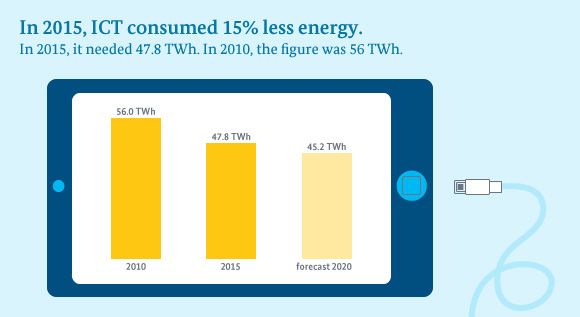Computer & co. in power-saving mode
Information and communication technologies (ICT) in Germany are using less and less energy. In 2015, they needed 15 per cent less than in 2010. Consumption is set to fall even further up to 2020.
 © Source: BMWi; Data: Fraunhofer IZM and Borderstep Institut
© Source: BMWi; Data: Fraunhofer IZM and Borderstep Institut
Whether it’s at home, in the office, or whilst waiting to cross the road, we take our smartphones and computers everywhere we go, sending great volumes of data whirring through the data networks. Information and communication technologies – ICT for short – have long been known to guzzle a lot of energy. However, we are now seeing them use less and less. In 2015, a total of 15 per cent less energy was needed for ICT in Germany compared with 2010 – despite the fact that the level of use, computing power, and volumes of data have all increased. In the past year, energy consumption sat at around 48 terawatt hours (TWh), whereas in 2010, the figure was 56. This is the finding of a joint study by the Fraunhofer Institute for Reliability and Microintegration and the Borderstep Institute. Researchers are expecting the electricity consumed by ICT to fall even further up to 2020, with it being estimated to drop to 45 TWh. Up to 2025, however, this is expected to rise to 46 TWh.
Federal Economic Affairs Minister Sigmar Gabriel said: “Technological progress, consumer information, and European standards all combined are leading to an improvement in the energy-efficiency of devices. This is reflected in the decline in electricity consumption in ICT across Germany of around 15% over the last five years. We will work to counteract the expected increase in electricity consumption in telecommunications networks and data centres up to 2025 through the use of clever instruments and by raising efficiency.”
Consumption falling in the home and at the office in particular
The amount of energy consumed by ICT is falling – particularly in private households and at the workplace. One of the main reasons for this is that devices such as televisions, smartphones, tablets, and notebooks are becoming ever more efficient. The amount of energy used by terminal equipment such as this is set to fall by another third up to 2025. By moving data storage and computing power to the ‘cloud’ – which means increased use of remote computers and a rise in the level of data transmitted – electricity demand in data centres and telecommunications networks is, however, rising considerably.
EU Energy Label exposes energy guzzlers
Saving energy in the home is going to continue, with an ever greater number of products – beyond ICT – set to become even more energy-efficient. It’s not only mobiles and computers that will use less energy, but washing machines, fridges, and vacuum cleaners as well. Not only in Germany, but right across Europe. Many of these products have a colour-coded label attached to them which informs the consumer about the amount of energy used by the device. This is known as the EU Energy Label. Many people will already be familiar with this label from their television sets. The labelling scheme is to help reduce energy consumption in Europe by a total of 20 per cent by 2020.

